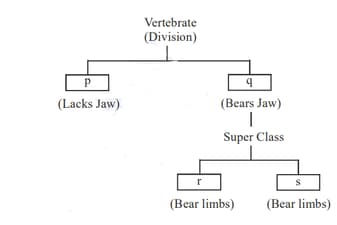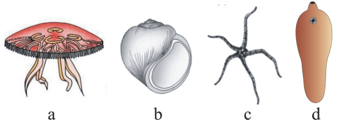Embibe Experts Solutions for Chapter: Animal Kingdom, Exercise 3: Level 3
Embibe Experts Biology Solutions for Exercise - Embibe Experts Solutions for Chapter: Animal Kingdom, Exercise 3: Level 3
Attempt the practice questions on Chapter 4: Animal Kingdom, Exercise 3: Level 3 with hints and solutions to strengthen your understanding. Biology Crash Course NEET solutions are prepared by Experienced Embibe Experts.
Questions from Embibe Experts Solutions for Chapter: Animal Kingdom, Exercise 3: Level 3 with Hints & Solutions
Which of the following pairs are correctly matched?
(A) Poikilothermous - Birds and mammals
(B) Agnatha - Petromyzon and Myxine
(C) Tunicates - Ascidia, Salpa and Doliolum
(D) Cartilaginous fishes - Betta and Labeo
Study the following table:
| S.NO. | Group | Number of chambers in heart |
Type of circulation |
Oxygenation of blood occurs in |
| I | Pisces | single | Gills | |
| II | Amphibia | single | Skin, buccal cavity, lungs | |
| III | Reptilia | Double | Lungs, skin | |
| IV | Mammalia | Double | Lungs |
Pick up the correct combinations from the above
Match the species in Column-I with their respective feature of body organisation in Column-II
| Column-I | Column-II | ||
| P | Mollusca | i | Pseudocoelom |
| Q | Annelida | ii | Radula |
| R | Nematoda | iii | Radial symmetry |
| S | Echinodermata | iv | Segmentation |
Choose the CORRECT combination.
Observe the following simplified scheme and choose the correct option that matches with the letters given in the boxes.

Which of the following animals are radial symmetrical ?

Identify the differences between Chondrichthyes and Osteichthyes:
a) Chondrichthyes have gill slits covered by operculum and Osteichthyes have gill slits without operculum
b) Chondrichthyes have a swim bladder and Osteichthyes do not have a swim bladder
c) Chondrichthyes contain placoid scales and Osteichthyes contain cycloid scales
d) Chondrichthyes contain terminal mouth and Osteichthyes contain ventral mouth
Statement 1 - In vertebrates, the notochord is replaced by vertebral column, but in protochordates, the notochord remains as it is.
Statement 2 - All vertebrates are chordates but all chordates are not vertebrates
In understanding different types of symmetry, the term used as principal axis means:
I) A flat area that run through any axis
II) An imaginary straight line joining two opposite points at the ends
III) An imaginary straight line joining the mid-point at one end and the mid-point at the opposite end
IV) An animal having its body parts arranged in such a manner to exhibit symmetry
